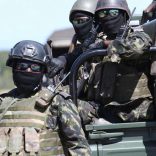Mozambique: Over 500 terrorist attacks recorded by end of august – OCHA | AIM report
‘Chinese Bank’ – MISA protests at ban on Media coverage of fraud trial

File
The Mozambican chapter of the regional press freedom body MISA (Media Institute of Southern Africa) has protested vigorously against the decision by the Kampfumo District Court in Maputo City to bar reporters from a major fraud trial.
The case concerns what has become known as “the Chinese Bank” – which is not a bank at all, but merely a ”Mutual Aid Association”, which accepted deposits from citizens and reimbursed them at high levels of interest.
Depositors had to deposit at least 20,000 meticais (330 US dollars, at current exchange rates) into bank accounts specified by the Association, and at the end of each month they would receive interest of 30 per cent (far higher than anything that real banks pay on deposit accounts).
This appears to be a Mozambican version of a pyramid scheme in which people are persuaded to part with their money against promises of payment unavailable through normal channels. The initial depositors get the promised payments, but the scheme inevitably runs out of money and collapses, with the later depositors losing everything.
In this case, collapse was avoided because of intervention by the Bank of Mozambique, which pointed out that the Association had no authorization to carry out banking activities. In July 2016, the central bank froze the Association’s accounts, and since then the depositors have been trying to recover their money, without success.
According to the Public Prosecutor’s Office, this illicit operation involved 482 million meticais, and 16,000 depositors. The prosecution is charging the seven suspects with fraud, the illegal collection of deposits, money laundering, and membership of a criminal association. The suspects are one Chinese and six Mozambican citizens, who have not yet been named.
When the case came to court, on 26 May, the defendants’ lawyer, Flavio Menete (who is chairperson of the Mozambican Bar Association), demanded that the court be closed to the press. He resorted to article 59 of the Mozambican Constitution, which states that accused persons enjoy the presumption of innocence. Menete interpreted this as meaning that not even the names of the defendants can be released until the case has reached a definitive conclusion.
Never before in Mozambican history has the presumption of innocence been interpreted in this way. Menete is clearly well aware of this since he admitted that the Penal Code states that trials are public. However, he claimed that this Penal Code norm is unconstitutional.
For good measure, Menete insulted the press. He said “my experience with the press is that they do not respect anything that people agree on. Here they’re going to say that they’re not going to do it, but we’ll see it on the TV news and in the papers”.
It was not entirely clear what “it” Menete had in mind – but the general thrust of his argument was evidently that no press should be allowed to cover any aspect of the trial.
Astonishingly, the judge Joao Guilherme eventually accepted Menete’s request and ordered the press to leave.
This sets a very dangerous precedent – it would allow any judge hearing any case to keep the press out.
Furthermore, Menete’s use of the Constitution is highly selective. He omitted Article 65, which states that trials are public “except when the protection of personal, family, social or moral intimacy, or powerful reasons of security of the hearing or of public order advise the exclusion or restriction of publicity”.
In other words, it is not just the Penal Code, but the Constitution itself which establishes the principle that trials are open to the press and the public. The exception concerning “personal intimacy” mainly concerns cases or rape and other sexual offences, and no issues of security or public order can conceivably arise from a fraud case.
When MISA wrote to Menete, asking him to explain his position he cited, not the Penal Code, but the 2007 Law on Judicial Organisation. But this law only bans the transmission of sound and film of trials, but not reporting them. There can be no live radio or television broadcasts of trials, but there is nothing in this law to prevent the media from naming defendants and telling the public what is happening in trials.
The MISA-Mozambique statement on the case declared that there is no reason to exclude the press from the “Chinese Bank” trial, and that Menete’s personal experience with the media cannot be used as an excuse for “banning journalistic coverage of a case in which hundreds of citizens were swindled and is of obvious public interest”.
MISA adds that journalists should continue to cover trials, while observing the legal ban on audio and visual recording.
MISA regrets the court’s decision “which has deprived citizens of access to information of public interest”, It argues that the constitutionally enshrined principles of freedom of the press and of the right to information cannot be hamstrung by other individual rights, such as the presumption of innocence.
MISA encourages journalists to continue covering trials “while observing ethical principles and the exceptions determined, as the case may be, by the court”.













Leave a Reply
Be the First to Comment!
You must be logged in to post a comment.
You must be logged in to post a comment.